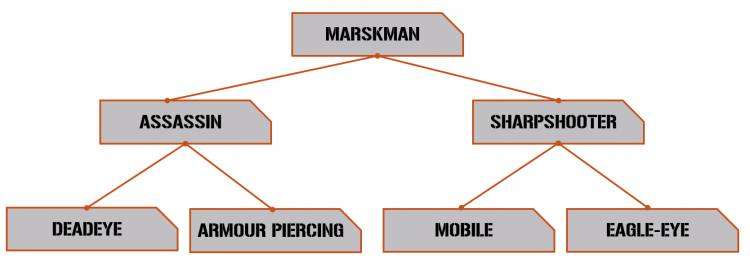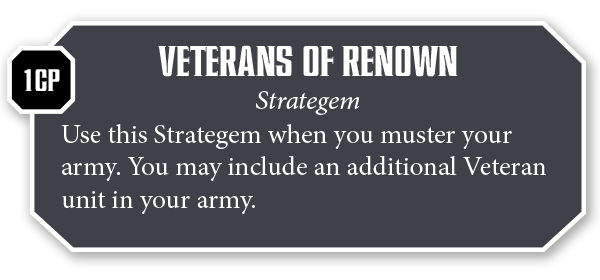The Warhammer 40,000 universe is a massive place, and the “Narrative Forge” hobby articles encourage thinking outside the box (literally) when putting models together and stretching yourself out in the hobby. They aim to make hobbyists and players comfortable growing beyond imitating the models they see in their Codexes and playing the rulebook missions, and serve as a source of inspiration for anyone wanting to forge new experiences in the hobby. This week, Robert “TheChirurgeon” Jones is picking his multi-part series on campaigns back up, this time talking about experience systems and levels in campaigns.
If detailed maps and troop movements are the first thing players think of when they think about running Warhammer campaigns, experience systems and leveling are the second. After all, if you’re going to be doing linked games with the same army over and over, why not have the units in those armies level up, becoming hardened veterans and gaining skills as they spend more time on the field? For campaigns with set warlords, why not have a system for handling them improving and becoming powerful warmasters, letting players build their own special characters?
Well, that’s where experience and leveling systems come into play. There are a few different ways to do this — which I’ll get into more below — but the basic idea is that the campaign has rules where, as players progress, units in their armies can gain experience points (XP), and when units gain a certain amount of XP, they gain new skills, abilities, or attribute boosts to reflect their increase in skill and the experience they’ve gained from their role in hundreds of battles.
As usual, I’m going to talk about a few different system of XP and Levels, the pros and cons of each, and I’ll cap things off with a proposed XP and Leveling system you can use in your games that I think combines the best elements from each system type to produce something that will work in most campaigns.
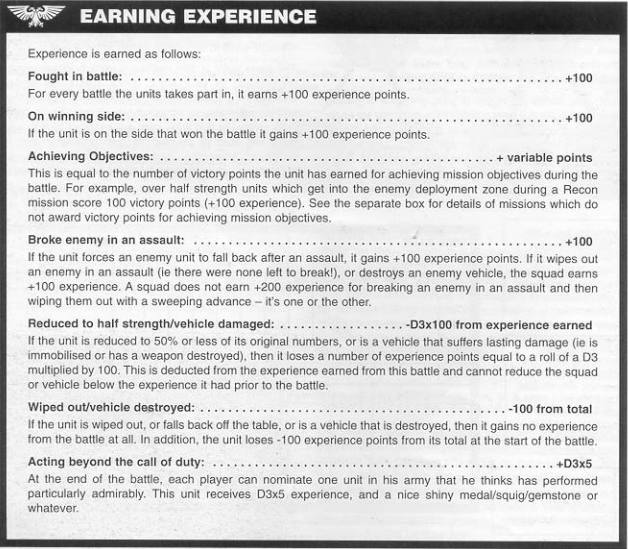
Experience Systems: The Upside
There are several cool advantages to having XP systems in your campaign:
- It’s Cool as Hell – Having custom units and having your warlord or units level up and improve over time is just really cool and there aren’t a lot of players to whom the idea doesn’t appeal. If this was the only upside, it’d be reason enough to consider adding an experience/leveling system to your campaign.
- You Can Use Rules to Help Tell Your Army’s Story – Experience and level systems give you a way to represent some of the cool moments and heroic actions of your units on the units themselves. Did your assault squad heroically and improbably take down a land raider in melee combat? Give them the Tank Hunters skill to represent their being a crack squad who knows how to take down a tank. Did your last scout heroically stand up to a charging Lictor? Maybe you promote him to a sergeant or character and give him Monster Hunter or a similar trait. In this way, the rules help you tell the story and make it more than just a narrative flourish. It also helps games matter, even for the losing player, and can make things all the more memorable when a unit improbably defies death and is rewarded for it afterward, creating interesting hobby opportunities for players who want to give their squads extra attention. These little details help build the story of a unit and players remember them for years. They also help contribute to great Narrative Armies.
- Creating Your Own Characters and Units – Some systems allow you the freedom to create your own special characters and units of renown, letting you build the narrative directly and indulging your desire to full bring the tabletop RPG experience into Warhammer. And when combined with systems for adding skills as they level up, you can further push them and see them improve with the story. Over the course of a campaign you can create some truly powerful units.
- Added Stakes – With an experience and leveling system, you can add stakes to the games beyond just the reward for winning or cost for losing – individual unit accomplishments can have XP rewards, and losing a veteran unit might cost you XP or even result in the loss of a powerful unit altogether. The added stakes give players a reason to push for great deeds and play well past the point that everything seems lost. You can also create additional XP rewards in the missions you play, giving players tertiary goals that don’t necessarily award VP, but help units progress, giving them other things to shoot for. These can also be used to balance things out for losing players, which can help avoid the issue of players who win more games also scoring the most XP and ending up with the most powerful units.
- Further Investment – Experience systems typically reward players for playing more, giving them more of a reason to be invested in their armies and the units they’ve built up. You want players to play games in the campaign, and missing out on XP is a powerful incentive to get a game or two in. That said, it can be a double-edged sword: If a player misses a round or two, they may feel like they’re too far behind for it to be worth getting back into it.
Experience Systems: The Downside
As cool as they are, there are several reasons to NOT use XP systems in your campaign, or at the very least, a few things you want to avoid with any system you make or use:
- Adding XP creates a lot of bookkeeping and things to track – Having an XP system for units, particularly one that has lots of awards and uses lots of points, means tracking XP, levels, and tracking the skills and upgrades each unit has accrued. If you’re playing with larger armies, that can mean tracking stats and upgrades for a dozen or more units. If you’re the GM, that means tracking this for everybody to make sure things all line up and so opponents know what’s coming. Because there’s so much bookkeeping, experience systems tend to work best when you have a small number of players, and you’re playing smaller games, or running a campaign that has an added Escalation element, to make things easy to track early on.
- Things can get complicated fast – All of this adds up quickly. Tracking XP, tracking levels, the extra abilities. It’s a lot, and in my experience, players are liable to either forget or just ignore the rules altogether. This is the worst possible outcome, so you want to make sure that if you’re putting in the time and energy to create an experience and leveling system, your players are really invested in the “custom characters and units” aspect of things, and that they’re on board for tracking everything and using it.
- Unbalanced combinations are going to come up – Any time you give players the choice of tacking abilities onto their units to make custom combinations, you’re going to inevitably have some overpowered combinations come up eventually. When that happens, you’ll need a way to deal with it.
- Requires you keep the same units over a campaign – If you’re going to have units gain experience and grow, you’ll need to track which units are actually gaining the points, and how they’re used. This means that you’ll either require players to use the same units game after game, or keep an ongoing roster of units they could use, and track XP for units who did and didn’t participate.
- Can create “feel bad” moments when units are killed – Ask anyone who’s ever played a long Dungeons and Dragons campaign: In most circumstances, it sucks to lose a well-loved, built-up character, and all the time and energy that went into them. Likewise, if you’re going to have a system for leveling characters up, you need to have rules in place for what happens when they die. The answer to this question could just be “nothing,” and that’s totally fine, but if you do risk losing something when the units die, then be aware that you’re going to incentivize certain styles of play as a result — players are going to be much more cautious with their veteran units, and may even avoid taking them, which is the opposite of what you’re looking to accomplish with these rules.
- XP Systems Can Create Snowball Effects – since XP systems often reward winning games, they can create snowball effects where winning players get the most XP, which then makes their units better, which then lets them get more XP, which then makes them better, and so on. This can make it harder for players who fall behind to catch up, leading to snowball effects where a player who wins several games early on ends up inevitably running away with the whole campaign.
Consider Adding An Experience System to Your Campaign If: You have 8 or fewer players, you’re playing smaller games, or you have an Escalation system in place, and your players want to create their own custom units and warlords and track their progress. The amount you’ll have to keep track of will increase significantly as time goes on, as games get larger, and as the player count increases, so it’s in your best interests to keep things as simple as possible and avoid tacking on complex systems when you have a ton of players.
All that said, let’s dig into the basics of an XP and Leveling System, talk about some of the systems that have been created for 40k already, and what works and what doesn’t about them.
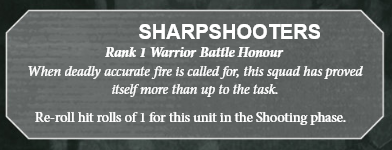
Chapter Approved 2018 – Battle Honours
The most current experience/level rules for Warhammer 40,000 8th edition were published in last year’s Chapter Approved 2018. Called Battle Honours, these rules are in many ways an updated form of the experience/leveling rules created all the way back in 3rd edition (and prior really, since these rules originated in Warhammer Fantasy Battles). These rules are used to represent the progression of various units to become particularly skilled. They apply to all units other than Characters, Swarms, Drones, and Buildings. The lack of Character progression is a bit weird here, but they note in their rules that you can use the Open Play Custom Character rules (also in CA18) if you want to handle progression/unique abilities for characters. Characters are assigned Experience Points after each battle for specific actions such as participating in the battle (+1), controlling an objective marker at battle’s end (+2), destroying TITANIC units (+3 per), or killing an enemy Warlord (+D3). Units that are destroyed during the battle lose D3 from this total — they can’t lose XP they had coming into the battle, but they can end up gaining nothing overall. Additionally, each player can nominate a single unit at the end of the battle to gain an additional D3 Experience Points as a kind of “MVP” Award.
Units then move up in “Rank” (Level) based on the experience they’ve acquired, with the first Rank (Blooded) occurring after a unit has accrued 5 XP and others occurring at increasingly longer intervals.
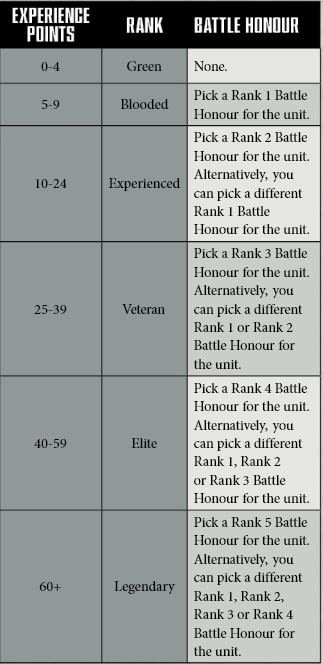
Units that have moved up in their Ranks are rewarded by being allowed to pick Warrior Battle Honours, upgrades that make a unit more powerful. There are 10 unit Battle Honours, (4 rank 1, 3 rank 2, 2 rank 3, 1 each for ranks 4 and 5), and 10 each in similar configurations for Monsters and Vehicles. As abilities, these are all relatively simple, and they range from being nearly worthless (Grizzled lets a unit ignore Leadership modifiers) to insanely strong (Sharpshooters gives a unit the ability to re-roll hit rolls of 1 as a level 1 skill).
Rosters and Tracking Units
The Battle Honours rules do not include rules for tracking the units on your army’s roster, nor for determining how to field them, outside of the rules for destroyed units (below).
Destroyed Units
Units with Battle Honours that are destroyed during a campaign battle have a 1 in 6 chance of being forced to recover and resupply after the battle, forcing it to miss a game as it trains new warriors and recovers from its injuries.
Balancing Factors
In typical Games Workshop fashion, the Battle Honours rules assume players are using Power Levels for some reason. Units that have gained Battle Honours increase their Power Level by 1 for each Honour they have received. This helps ensure that one player having several high-ranking units will not be coming to the battle with a significant advantage. Note that generally, 1 Power Level = About 20 points, so if you want to use points like all the cool kids, that’s the conversion rate.
What Works
There are several good things about these rules.
- Simple Points Counts – Using small numbers for XP is a good idea. There’s no real need to have XP counts number in the hundreds, particularly when you’re only going to be giving a single unit a few skills over the course of the campaign. Keeping the numbers small here is a great idea.
- Good Progression Factors – Generally, the ways you gain XP in the Battle Honours system are all pretty good. They’re intuitive and they tend to line up with things you already want to be doing in most games, such as destroying large units, killing enemy warlords, and capturing objectives. The MVP award is also a great idea, and something that I’d steal for any experience system I built on my own.
- Simple Abilities – Although the balance on them is all over the place, the abilities you get through Battle Honours are all pretty simple and easy to remember. Most of the bonuses are still meaningful, and almost every army can make something out of what’s available.
- Simple Loss Penalties – Losing a high-ranking unit doesn’t mean permanent loss, so players are incentivized to actually use their units. The penalty is, at worst, losing your unit for one game, which everyone can live with as a risk. It won’t even be a factor most of the time.
- Multiple Options – Players have multiple build options for their Battle Honours, allowing them to make choices and customize their units to their liking. This also helps ensure that a unit only gets Battle Honours it can really use.
What Doesn’t Work
While there are several things I like about these rules, there are several things that don’t really work, either.
- Too Many Upgrades – The total number of possible upgrades for a given unit is about right, actually — I might up it to 12-15 for units but overall, I think any more than that and you give players too many options. Rather, I think that having units that can go up to level 5 and have as many as five Battle Honours is far too many. It’s too much to keep track of for even one or two units, and if your campaign runs several weeks with the same units being used over and over, you could have entire armies filled with units that have three or more Battle Honours. That’s a lot of tracking, and the added points/power costs (see below) may mean that you just don’t want to bother taking those units over and over, which is also the opposite of what you’d want to see in a campaign with these systems.
- The Cost Structure – While I think it’s good that the system builds in a way to balance upgraded units, the method of balancing isn’t great. The upgrades themselves tend to favor large units that will get the most out of having lots of re-rolls or +1 to Wound, where adding 20 to 80 points will also make the lowest impact. But even with this, you potentially run into the Kill Team problem, where it’s advantageous to have more units rather than highly upgraded expensive elite units, particularly for those that are supposed to be chaff/hordes. This means that players might feel like they shouldn’t take units with higher ranks which again, is counter to why you’d want to have this system in the first place.
- Power Balance Issues – There’s way too much room between the different available Battle Honours in terms of power, and because of the added cost and how they work, they tend to favor large units that will benefit the most from added efficiency, and will usually favor elite units over hordes (with some exceptions). That’s not ideal.
- Nothing Campaign-Specific – This isn’t necessarily terrible, but I’d have preferred to see more upgrades that actually involve campaign mechanics. If you are going to have a mechanic for units dying and being unavailable, may as well give players a way to prevent that with some investment in things like medics or a “very tough” or “expert mentors” ability that allows them to shrug off casualties and keep their skills.
- No Unit Guidance – How are persistent units tracked? If I don’t want to run a veteran unit, can I replace it with an identical one that has no experience? Do I need new models? How should campaigns handle this? This kind of flows from the earlier issues, because you’re more likely to have these problems when players don’t want to use their leveled-up units.
- No Warlords/Characters – What even is that? Experience Systems and Levels are explicitly for making your own special self-insert fanfic characters (original content DO NOT STEAL). Why even have a leveling system if I can’t make Chapter Master xXx_Weedlord_Goku_Senpai_420_xXx and give him rules to reflect his special training?
Kill Team – Specialisms
Kill Team has a similar set of upgrades for units, allowing for Kill Team members to grow and gain new skills. Kill Team Specialists gain 1 Experience Point for finishing a battle and another point if they used one of the tactics related to their Specialism. As they accrue Experience points, they can level up, allowing them to choose new skills from their specialism’s tree. As they level up, they also go up in point cost; level 2 specialists cost +4 points, level 3 specialists cost +8 points, and level 4 specialists cost a whopping +12 points. If you’re interested in reading more about the specialisms themselves, we’ve written about them here, here, and here.
Beyond Specialists, fire teams can also gain experience, gaining random skills as they level up (rolling on a chart of 6 possible outcomes, re-rolling if they end up on something they already have). These 6 abilities vary wildly in strength from the marginal (+1″ Movement) to the incredibly strong (subtract 1 from injury rolls for this model). These rules seldom get used, though the higher level specialists see much more play at the casual level.
Generally, the Kill Team Specialist rules suffer greatly from the points balancing mechanism placed on them. It is seldom the right play to take a high-level specialist over another team body, though there are some level 2 combinations worth considering. Additionally, each specialism comes with not only an ability for each level gained but also a custom Tactic for each of levels 1, 2, and 3. This means that specialists may have up to 7 different things going on in a game. This is more manageable in smaller game systems like Kill Team, but it’s also still more likely to lead to players forgetting key rules and abilities. The upside is that almost every tree is powerful and interesting, and the tree aspect can make for some real decisions (or rather it would, if most of the time there wasn’t a clear “best” choice for building your specialists).
Building Your Own System
If you’re running a smaller campaign – both in terms of player counts and points – then the Battle Honours rules are fine enough. But if you’re running something larger, you’ll probably need something that’s both more balance-focused and simpler. There are a few things to keep in mind that you’ll need for your system:
- Guidelines for tracking units. You need to be up-front about how units will be tracked and what players are expected to do with regard to their rosters.
- Rules for losing a unit. Even if the answer is “nothing,” you need to clarify what happens if a special high-level unit gets wiped out in battle (or sustains heavy losses).
- A balancing mechanism. You need a way to keep things balanced, so one player who has a few good games doesn’t start to run away with things. This can demoralize other players and lead to players dropping out and an early campaign end. Also, try and keep your bonuses small in order to keep things from getting out of hand.
- An incentive to use higher-level units. Your system should incentivize players (and not punish them) for taking their veteran units.
- Keep it simple. I say this every time, but as soon as the rules get too complex, your players are going to forget or ignore them. Keep things simple so your campaign rules get used.
Some Suggestions
Every campaign and player group will have different needs when it comes to an experience and leveling system, so it’s difficult to suggest a one-size-fits-all solution here. So instead, what I’m going to do is present a solution that I think would work for my campaign (more info on that here), a mass campaign with about 25 players. We’ve already done a round of custom Warlords which I have mixed feelings on. If I had to do it again and include a leveling system, I’d probably consider something like the following for my campaign:
The Leveling System: Veterans of Renown
I’ve got too many players to have people tracking individual unit experience points after every battle. So instead, what I’d do is at regular intervals — most likely the end of every campaign round, I’d have players nominate a single unit to become a Veteran unit. Veteran units get +1 Ld (to a maximum of 9) and gain a single special ability. chosen from a list I’d create. The list will include small, but significant bonuses. A few that I have in mind are:
- Dependable. This unit can re-roll one failed to hit, to wound, armour save, or morale test per turn.
- Loyal bodyguards. If your warlord is within 3″ of a model in this unit and is wounded by an enemy attack, roll a D6. On a 2+, you can choose to allocate that wound to this unit instead. You may only use this ability once per phase.
- Forward scouts. If this unit is on the battlefield, then every time your opponent uses a stratagem, roll a D6. On a 6, you gain 1 CP.
These are smaller than “full re-rolls of 1 for a squad” and adding 1 to wound rolls, but are still nice to have and help describe how a unit might act. In terms of Unit Tracking, I’d have players submit their units to me to keep track of in a public spreadsheet (Google Sheets, probably). This also allows me to vet them to help avoid any particularly rough combinations I might miss. I’d likely avoid having penalties for Losing a unit in battle, just because that’s more bookkeeping no one wants and it helps me avoid games where only one player has a Veteran unit available. In order to help keep things balanced, I’d also keep the units free, but max them out at 1 per army per game. This ensures that each player will have a Veteran unit on the table if they want it, the bonuses aren’t so massive that if they don’t have one it isn’t a major issue, and keeps the counts low. As the campaign goes on, I’d introduce the following Stratagem:
Characters in This System
Here what I’d do is, if a player wants to nominate a CHARACTER instead of another unit, I’d allow them to do so and give them the option of either giving that character a Warlord Trait that they have access to or one upgrade from the “Create Your Own Character” rules. However, this would be a tightly-controlled submission process where I’d have to OK all the upgrades personally. Otherwise, the first submission you get is someone’s quad-fusion blaster crisis commander who can target Characters even if they aren’t the closest unit, and let me tell you that guy is not fun to have terrorizing your campaign. In fact, I think I’d redo the whole set of character abilities and remove that one.
Anyways, while my system still needs some testing and probably more balance work, I like how it streamlines the process to make upgrades simpler to allocate and remember.
Next Time: Map Campaigns
Well now I’m on a kick and I’m thinking about how to turn this into a real thing, so maybe that’ll be something I touch on in a future Narrative Forge article. We’ll likely have Tyler “Coda” Moore in here next week talking more about Narrative Armies, but after that I’ll be back talking about Map Campaigns, and eventually I may post a set of campaign experience rules you can download and use.
In the meantime, if you’ve got your own experience/leveling system you’re a fan of, or if you have any questions, comments, feedback, or recommendations, shoot us a note in the comments below or email us at contact@goonhammer.com.

